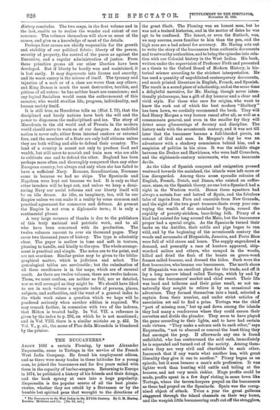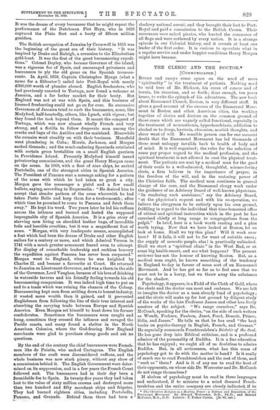THE BUCCANEERS.*
ABOUT 1666 a certain Fleming, by name Alexander Exquemelin, came to Tortuga in the service of the French West India Company. He found his employment odious, and as there were many trades in these latitudes for a young man, he joined the buccaneers and for five years sailed with them in the capacity of barber-surgeon. Returning to Europe in 1674, he published a history of his friends and their doings, and the book sprang at once into a huge popularity. Exquemelin is the popular source of all the best pirate- stories, whether they are retold by a Stevenson or by the humble but spirited pens that wrought to the directions of • The Bveuineens in Via Wan India in *As IYrrtk Century. By C. H. Haring. London: Methuen and Co. [10e. Bd. net.] the great Skelt. The Fleming was an honest man, but he was not a trained historian, and in the matter of dates he was apt to be confused. The lancet, or even the flintlock, was, we may assume, more familiar to him than the pen, and the high seas are a bad school for accuracy. Mr. Haring sets out to write the story of the buccaneers from authentic documents and trustworthy authorities, and to bring the episodes into rela- tion with our Colonial history in the West Indies. His book, written under the supervision of Professor Firth and presented as a thesis to the Oxford Board of Modern History, is his- torical science according to the strictest interpretation. He- has used a quantity of unpublished contemporary documents, and much printed literature in English, French, and Spanish. The result is a, sound piece of scholarship, and at the same time a delightful narrative, for Mr. Haring, though never inten- tionally picturesque, has a gift of dry humour and a clear and vivid style. For those who care for origins, who want to know the rock out of which the best modern " Skeltary" has been hewn, we cordially recommend the book. They will find Henry Morgan a very human rascal after all, as well as a consummate general, and even in the smaller fry they will detect some glimmerings of decency and discipline. The history ends with the seventeenth century, and it was not till later that the buccaneer became a full-blooded pirate, an outcast of God and man. In Morgan's day he was an adventurer with a shadowy commission behind him, and a. suspicion of politics in his aims. It was the middle stage between the Drakes and Hawkinses, who were half Crusaders, and the eighteenth-century miscreants, who were incarnate devils.
As the tides of Spanish conquest and emigration pressed westward towards the mainland, the islands were left more or less disregarded. Among them arose sporadic colonies of English, French, Dutch, and Danes, who existed on suffer- ance, since, on the Spanish theory, no one but a Spaniard had a. right in the Western world. Hence these squatters had always a certain fear and hatred of Spain, and the fabulous tales of ingots from Pern and emeralds from New Granada, and the sight of the two great treasure-fleets every year con- veying the wealth of the mainland to Spain, roused the cupidity of poverty-stricken, bare-living folk. Piracy of a. kind had existed for long around the Main, but the buccaneers proper had a special origin. As the Spaniards turned their backs on the Antilles, their cattle and pigs began to run wild, and by the beginning of the seventeenth century the woods and savannahs of Hispaniola, Jamaica, and Porto Rico were full of wild steers and boars. The supply engendered a demand, and presently a race of hunters appeared, ship- wrecked sailors and others, who camped in the woods, killed and dried the flesh of the beasts on green-wood frames called boucans, and dressed the hides. Such were the first boucaniers, who became our buccaneers. The north shore of Hispaniola was an excellent place for the trade, and off it lay a long narrow island called Tortuga, which by and by became the buccaneers' market and chief resort. Their life was hard and toilsome and their gains small, so not un- naturally they sought to relieve it by an occasional sea, adventure. They formed themselves into a band, selected a. captain from their number, and under strict articles of association set sail to find a prize. Tortuga was the chief "port of missing men," but up and down among the islands they had many a rendezvous where they could careen their corvettes and divide the plunder. They seem to have played the game according to their lights, and to have had certain rude virtues. "They make a solemn oath to each other," says Exquemelin, "not to abscond or conceal the least thing they find amongst the prey. If afterwards any one is found unfaithful, who has contravened the said oath, immediately he is separated and turned out of the society. Among them- selves they are very civil and charitable to each other. Insomuch that if any wants what another has, with great liberality they give it one to another." Piracy began as an episode, but it soon became a man's sole profession. It was lighter work than hunting wild cattle and toiling at the boucans, and not very much riskier. Huge profits could be made, profits spent in a few days' rioting in some town like Tortuga, where the tavern-keepers preyed on the buccaneers as these had preyed on the Spaniards. Spain was the recog- nised object of attack. Twice a year the great galleons staggered through the island channels on their way home, and the waspish little buccaneering craft cut off the stragglers.
It was the dream of every buccaneer that he might repeat the performance of the Dutchman Piet Heyn, who in 1628 captured the Plate fleet and a booty of fifteen million guelders.
The British occupation of Jamaica by Cromwell in 1655 was the beginning of the great era of their history. "It was inspired by Drake and Raleigh, a reversion to the Elizabethan gold-hunt. It was the first of the great buccaneering expedi- tions." Colonel Doyley, who became Governor of the island, was a vigorous foe of Spain, and encouraged privateers and buccaneers to ply the old game on the Spanish treasure- route. In April, 1659, Captain Christopher Myngs (what a name for a filibuster !) sailed into Port-Royal with nearly £300,000 worth of plunder aboard. English freebooters, who had previously resorted to Tortuga, now found a welcome at Jamaica, and a far better market for their booty. But England was not at war with Spain, and this business of licensed freebooting could not go on for ever. So successive Governors of Jamaica tried to curb the buccaneers, some, like Modyford, half-heartedly, others, like Lynch, with vigour; but they found the task beyond them. It meant the conquest of Tortuga, which was now almost wholly French and very strong, and a flotilla to follow desperate men among the creeks and bays of the Antilles and the mainland. Meanwhile the corsairs went steadily on with their business. Mansfield went plundering in Cuba; Morris, Jackman, and Morgan sacked Granada ; and the much-enduring Spaniards retaliated with certain gross brutalities on a small English garrison in Providence Island. Presently Modyford himself issued privateering commissions, and the great Henry Morgan came on the scene. In 1668, with a fleet of nine ships, he sacked Portobello, one of the strongest cities in Spanish America. The President of Panama sent a message asking for a pattern of the arms with which he had taken so great a city. Morgan gave the messenger a pistol and a few small bullets, saying, according to Exquemelin " He desired him to accept that slender pattern of the arms wherewith he had taken Porto Bello and keep them for a twelvemonth ; after which time be promised to come to Panama and fetch them away." He kept his word. Two years later be led his ruffians across the isthmus and burned and looted the supposed impregnable city of Spanish America. It is a grim story of starving men living on shredded leather bags, of incredible toils and horrible cruelties ; but it was a magnificent feat of arms. "Morgan, with very inadequate means, accomplished a feat which bad been the dream of Drake and other English sailors for a century or more, and which Admiral Vernon in 1741 with a much greater armament feared even to attempt. For display of remarkable leadership and reckless bravery the expedition against Panama has never been surpassed." Morgan went to England, where he was knighted by Charles IL and became a favourite at Court. He returned to Jamaica as Lieutenant-Governor, and was a thorn in the side of the Governor, Lord Vaughan, because of his love of drinking in waterside taverns and his friendly feeling towards his old buccaneering companions. It was indeed high time to put an end to a trade which was ruining the chances of the Colony. Buccaneering kept men from settling down to honest industry, it wasted more wealth than it gained, and it prevented Englishmen from following the line of their true interest and absorbing the carrying trade between Europe and Spanish America. Even Morgan set himself to hunt down his former confederates. Sometimes the buccaneers were caught and hung, sometimes they crossed the isthmus and ravaged the Pacific coasts, and many found a shelter in the North American Colonies, where the God-fearing New England merchants were glad to purchase cheap goods and ask no questions.
By the end of the century the chief buccaneers were French. men like de Pointie, who sacked Cartagena. The English members of the craft were disconsidered ruffians, and the whole business was now stark piracy, without any show of a commission behind it. The English Government were deter- mined on its suppression, and in a few years the French Court followed snit. The buccaneers had in their day been a formidable foe to Spain. In twenty-five years they had taken loot to the value of sixty million crowns and destroyed more than two hundred and fifty merchant ships and frigates. They had burned eighteen cities, including Portobello, Panama, and Granada. Behind them there had been a
shadowy national assent, and they brought their loot to Port- Royal and paid a commission to the British Crown. Their successors were naked pirates, who hunted the commerce of all flags and were outlawed by every nation. It is a strange episode in our Colonial history, and it reveals at least one leader of the first order. It is curious to speculate what in a regular service and under happier conditions Henry Morgan might have become.



































































 Previous page
Previous page